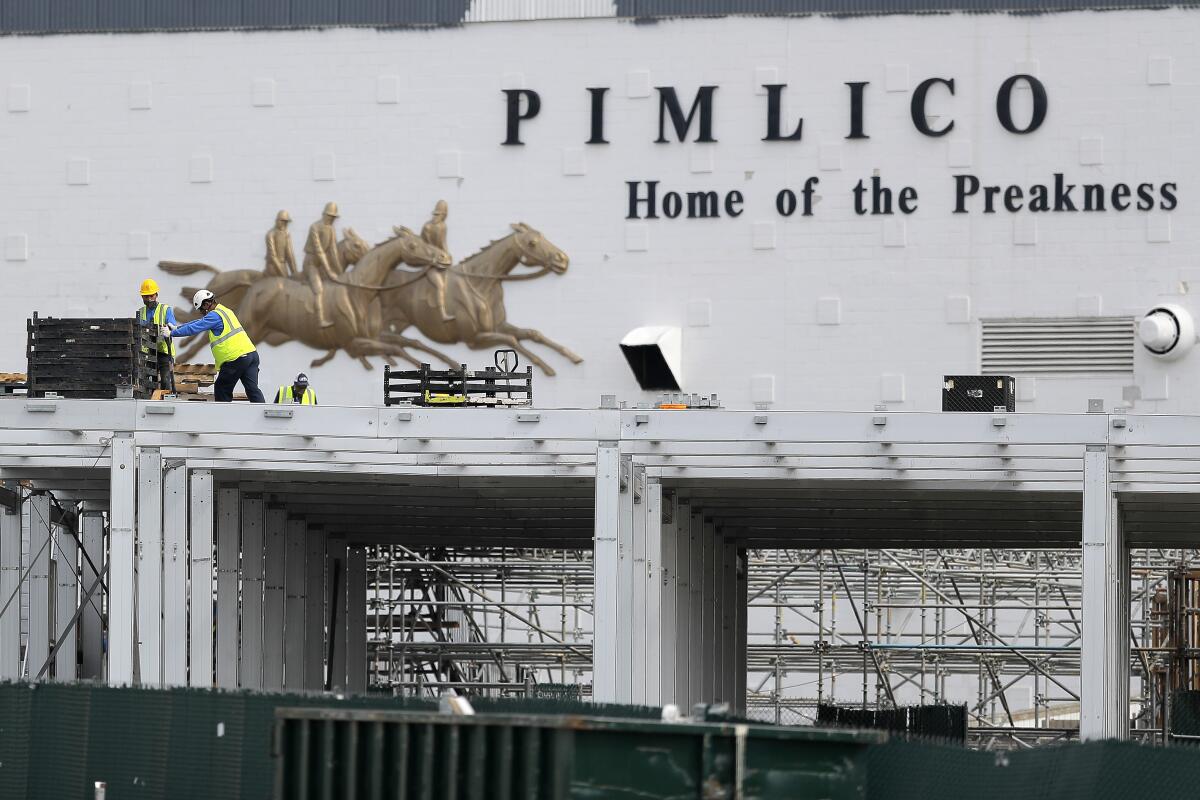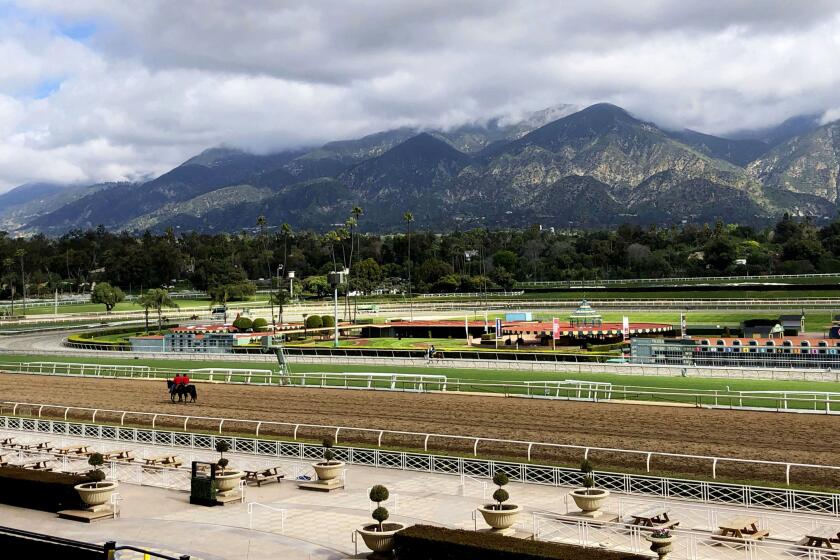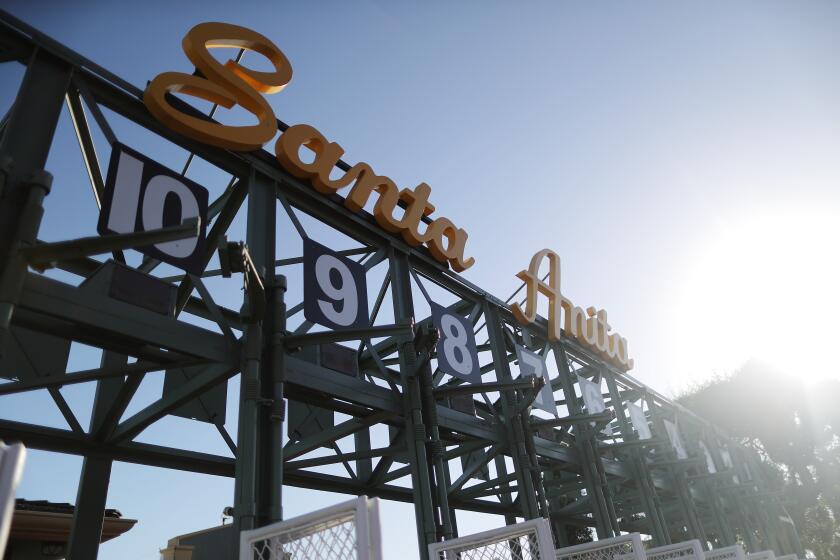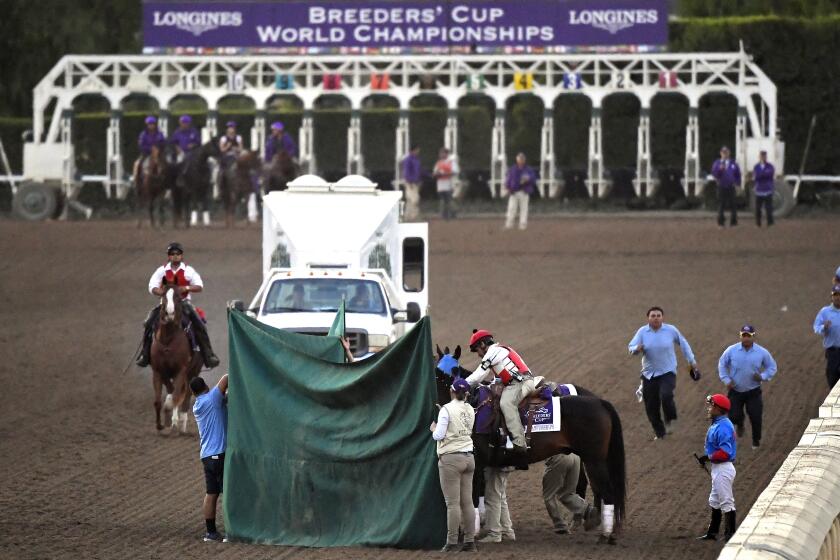Stronach Group to contract racing operations at Pimlico, turn track over to state

- Share via
The Stronach Group, owner of Santa Anita Park, is getting smaller as a racetrack operator after it was announced that an agreement in principle has been reached to turn over Pimlico Race Course in Baltimore to the state of Maryland for much-needed renovation and rebuilding. The track would then be leased to a new set of operators chosen by the state.
It also means that the Preakness Stakes, the second leg of the Triple Crown, will be held at nearby Laurel Park, also owned by TSG, for at least two years starting in 2025. TSG will keep the intellectual rights to the Preakness and lease them to the new operators of Pimlico. Financial terms were not disclosed.
Gov. Wes Moore said he was hoping the details of the transaction would be concluded in the next 30 to 45 days. Craig Fravel, executive vice chairman of TSG’s 1/ST Racing and Gaming, said he was hoping to wrap things up in 60 to 90 days.
“I’m very confident this will get done,” Fravel said.
The closure of Golden Gate Fields is just one problem California horse racing faces. Non-competitive purses and a sinking foal crop paint a tough picture.
It is the second track that TSG has exited from since July. The company announced that it was closing Golden Gate Fields in Northern California at the end of last year, but then gave it a six-month lifeline and will close the track in June.
The contraction adds more uncertainty to the already-frazzled California horse racing community about the future of racing at Santa Anita Park, a prize piece of real estate that is estimated to be worth at least $1 billion. The fear, unfounded to date, is that the Santa Anita property is just too valuable to remain a racetrack.
Fravel said there is nothing for horsemen in Southern California to be nervous about.
“I would say unequivocally we are not getting out of the racing business,” Fravel said. “I look at the Maryland situation like when kids go off to college, you have one less mouth to feed, but they are still part of the family. We will still be part of Maryland racing.”
Fravel also reiterated what he told The Times in December about the track not being up for sale.
Transporting horses has been made more difficult as FedEx shuts down its equine shipping business for the holidays ahead of Santa Anita’s opener.
“I get inquiries about if Santa Anita is up for sale,” Fravel said. “I send them to the real estate folks in Toronto [TSG’s headquarters] and I’m always told the same thing: The track is not for sale.”
TSG is maintaining control of Laurel Park, at least for a couple of years. It’s expected that when Pimlico is renovated that most of the year-round racing will be held there. Currently, Laurel conducts most of the racing in Maryland, with a couple of very short meetings at Pimlico.
Informed speculation is that Laurel will become nothing more than a real estate property once racing moves to Pimlico. It would be an ignominious end to a racetrack that TSG executives were once touting as a possible site for the Breeders’ Cup.
When the closure of Golden Gate was announced, part of the rationale was that resources from the money-losing track could be diverted to Santa Anita. Maryland racing was also losing money, according to TSG, but no such claim of sending money to prop up Santa Anita was made in light of the divestiture of Pimlico.
“There is not a specific cash flow diversion,” Fravel said. “I think it’s very clear we’re going to focus our time, effort and resources at Gulfstream Park [in South Florida] and Santa Anita. We have a long-term capital investment plan, and this could help support them. But, it’s not like any of the money savings gets turned over. But money is fungible, so who’s to say it can’t help down the road?”
The size of a race horse and its natural instincts make it nearly impossible to survive serious injuries at the track, but many are trying to improve the odds.
The Pimlico rebuilding plan is scheduled to take three years, but Fravel said Laurel has committed only to hosting the Preakness in 2025 and 2026. There will be no changes to this year’s Preakness, which will be held May 18.
“The contemplation is that the Preakness will resume at Pimlico in 2027,” Fravel said.
The state of Maryland is scheduled to pay for the Pimlico redevelopment, pending legislative approval, using about $400 million from previously earmarked funds from 2020. There will also be private investors who will make some of the other improvements. The plan is for new seating and restaurants, a parking garage and a hotel on the property.
Maryland racing and California racing have at least one thing in common: neither have on-site casinos, leaving them at a huge disadvantage because of a lack of gaming revenue to bolster purses. Maryland does get supplemental revenue from state gaming, which California tracks do not.
And without big purses, you don’t get as many horses, which cuts back on mutuel handle, the engine that drives racetrack profits.
This weekend, a maiden race at Laurel has a purse of $27,000 compared to Santa Anita’s $65,000, Turfway Park’s (in Kentucky) $70,000, Aqueduct’s (in New York) $80,000 and Gulfstream Park’s $89,000. During the Churchill Downs meet, maiden races can pay $120,000. Maryland does get supplemental revenue from state gaming, which California tracks do not.
California figuring out a solution to its purse problem might be the biggest obstacle it faces. And with no solution in sight.
More to Read
Go beyond the scoreboard
Get the latest on L.A.'s teams in the daily Sports Report newsletter.
You may occasionally receive promotional content from the Los Angeles Times.














